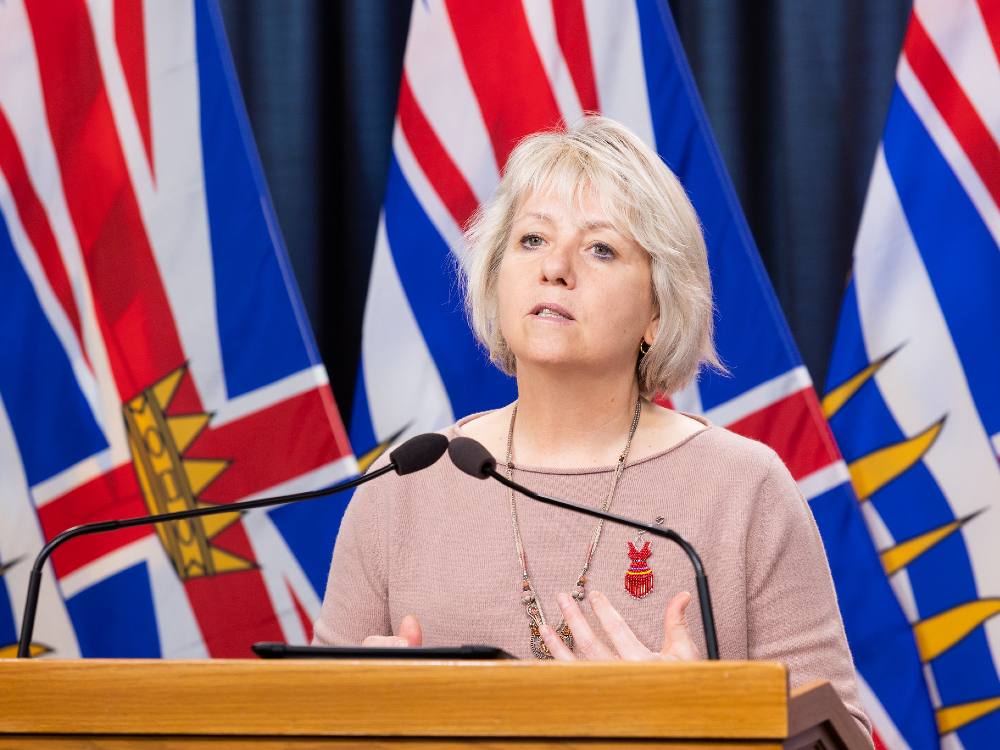British Columbia will offer spring booster doses to older and immunocompromised adults at risk of severe outcomes from COVID-19 starting in April, public health officials announced Friday.
The announcement comes after the National Advisory Committee on Immunization recommended spring boosters for high-risk groups the previous Friday.
Spring boosters will be available in B.C. to seniors over 80, Indigenous people over 70, residents of long-term care and congregate living facilities, home care clients and anyone 18 and over who is moderately to severely immunocompromised and had their last dose or COVID-19 infection at least six months ago.
Adults over 60 and Indigenous people over 50 who have never had COVID-19 should consider getting a spring booster as well, provincial health officer Dr. Bonnie Henry said Friday.
“The focus will be on protecting people with the highest risk of severe outcomes,” Henry told media from Vancouver.
Vaccines are “proven to provide good strong protection but it decreases over time,” said Henry, particularly among older and immunocompromised adults who are at increased risk of severe outcomes, hospitalization and death.
Henry’s remarks to media, emotion rising in her voice at times, came the day before the third anniversary of the World Health Organization declaring COVID-19 a pandemic.
Friday’s announcement largely follows the guidance issued by NACI, which called for spring boosters for all adults over 65, immunocompromised adults, as well as anyone residing in congregate living facilities.
B.C.’s strategy continues “a fundamental principle… which is vaccines that protect first those that are most vulnerable to COVID-19,” said Health Minister Adrian Dix.
Henry said B.C. is going further to offer spring boosters to older adults without previous infection because “hybrid immunity” from vaccination and a subsequent infection is shown to be more effective and last longer than protection from vaccines or infection alone.
Data shows about 80 to 90 per cent of adults, particularly under 50, have been both infected and vaccinated, meaning they have hybrid immunity, Henry said. “Across that age spectrum, we have a really high level of immunity,” she said.
But some public health advocates say all adults should have access to a spring booster amid ongoing transmission and few public health measures.
In response to NACI’s Friday guidance, non-profit advocacy organization Protect Our Province BC said in a statement the risk of long COVID and post-viral illness should be considered severe outcomes in the province’s vaccination strategy.
They have also called on the province to improve ventilation, increase access to Paxlovid to treat COVID-19, and mandate masks in public indoor spaces.
“Imperfect as they are, current vaccines are the only strategy being used in Canada and B.C. when it comes to COVID-19 protection,” Protect Our Province said in an emailed statement to The Tyee on Monday.
Bivalent boosters provide significantly improved protection against severe illness and death from all strains of COVID-19, including several Omicron strains, several recent studies have confirmed.
Omicron strains now make up more than half of cases in B.C., according to the BC Centre for Disease Control’s March 2 report on genome sequencing.
Bivalent vaccines, rolled out in B.C. last fall, target Omicron strains as well as the original virus the first vaccines were based on.
As public health measures have been removed in B.C., the population’s vaccine uptake has decreased for each subsequent booster dose recommended for adults and teens over 12.
About 86 per cent of British Columbians over 70 have received three doses of vaccine, while 73 per cent received a fourth dose. Just 48 per cent have received their fifth dose, which started to become available last fall.
Only 63 per cent of adults over 18 have received three doses, and 38 per cent have received four. Less than half of children 5 to 11 have the recommended two doses, and only 13 per cent of kids aged six months to four years do either.
Henry urged those who had not yet been vaccinated to speak to a doctor or pharmacist about getting their first shot.
“Unvaccinated people remain at significantly higher risk of getting COVID-19 and getting severely sick,” said Henry. “This virus is going to be with us for the foreseeable future.”
Henry said she anticipated that all adults would be eligible for another booster shot in advance of the upcoming respiratory season this fall.
“We’re not at the end of the pandemic yet,” Henry said. “We don’t yet know what the rest of this year will bring… but there is less risk of a brand new virus from which we have no protection.” ![]()
Read more: Health, Coronavirus
















Tyee Commenting Guidelines
Comments that violate guidelines risk being deleted, and violations may result in a temporary or permanent user ban. Maintain the spirit of good conversation to stay in the discussion and be patient with moderators. Comments are reviewed regularly but not in real time.
Do:
Do not: